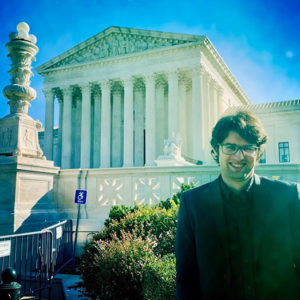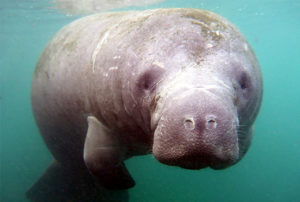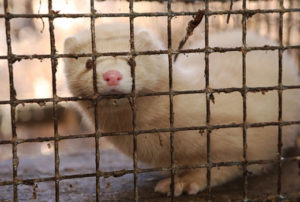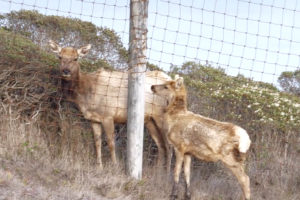Fall Semester 2022 was action-packed with more students than ever! Rachel Mathews, formerly a senior attorney with the PETA Foundation, joined the Clinic as our Clinical Instructor, and we were extremely fortunate to welcome the return of Rebecca Garverman, Class of 2021, as our Clinical Fellow.
 On behalf of a coalition of animal protection groups, we submitted an amicus brief in the Supreme Court of the United States in support of Proposition 12 — an initiative that bans the sale of pork products produced through especially cruel confinement practices. The amicus brief was drafted by Ms. Garverman and clinician 3L Ashton Macfarlane (pictured outside the Supreme Court of the United States on Tuesday, October 11, 2022, when the Court heard arguments in the case).
On behalf of a coalition of animal protection groups, we submitted an amicus brief in the Supreme Court of the United States in support of Proposition 12 — an initiative that bans the sale of pork products produced through especially cruel confinement practices. The amicus brief was drafted by Ms. Garverman and clinician 3L Ashton Macfarlane (pictured outside the Supreme Court of the United States on Tuesday, October 11, 2022, when the Court heard arguments in the case).
 In November, 2022, on behalf of several conservation groups, we submitted a listing petition to the Fish and Wildlife Service (FWS) to reclassify the Florida manatee as an “endangered” species under the Endangered Species Act due to the many adverse human and environmental impacts that are causing an precipitous decline in the population — so much so that the FWS is now providing supplemental food to manatees in Florida who are starving from a lack of sea grass. The Petition required a detailed analysis of both the science and the relevant legal framework. It was prepared by students over two Semesters, under the indomitable leadership of clinician Ben Rankin (3L), with assistance from clinicians Max Hantel, Babs Tsao, Max Lupin, and Savanna Bergeron.
In November, 2022, on behalf of several conservation groups, we submitted a listing petition to the Fish and Wildlife Service (FWS) to reclassify the Florida manatee as an “endangered” species under the Endangered Species Act due to the many adverse human and environmental impacts that are causing an precipitous decline in the population — so much so that the FWS is now providing supplemental food to manatees in Florida who are starving from a lack of sea grass. The Petition required a detailed analysis of both the science and the relevant legal framework. It was prepared by students over two Semesters, under the indomitable leadership of clinician Ben Rankin (3L), with assistance from clinicians Max Hantel, Babs Tsao, Max Lupin, and Savanna Bergeron.
On behalf of Rise for Animals and the Animal Legal Defense Fund, we continued to litigate the case against the United States Department of Agriculture challenging its refusal to improve the standards for the psychological well-being of primates used in research. The case is now fully briefed on the merits, and we expect to have an oral argument during the Spring 2023 Semester, and you can read our opening brief and reply brief on our website.
On behalf of the same clients, we also continued to litigate our related case against the USDA challenging its secret inspection policy under which it no longer conducts full annual inspections of each research lab subject to the Animal Welfare Act, but instead does only partial inspections of labs accredited by the industry-dominated Association for Assessment and Accreditation of Laboratory Animal Care International (AAALAC) – which are the majority of labs in this country. We received the official Administrative Record and will be filing our opening brief during the Spring 2023 Semester.
The Clinic is also challenging certain particularly horrific eye research being performed on monkeys at Harvard Medical School. These experiments are not only cruel, but completely unnecessary and a huge waste of taxpayer money. In October 2022 we sent a letter to the Medical School’s official Institutional Animal Care & Use Committee (IACUC) expressing our concerns and calling on the Committee to halt these experiments.
In October, the City of Cambridge became the fifth municipality in Massachusetts to ban the sale of fur. The Clinic supported the ordinance with a written submission detailing the gratuitous cruelty of the factory farms that breed and slaughter animals for their fur, and clinician Arlene Lopez (3L) testified at the City’s hearing on the matter.
gratuitous cruelty of the factory farms that breed and slaughter animals for their fur, and clinician Arlene Lopez (3L) testified at the City’s hearing on the matter.
We continued to advocate on behalf of cephalopods—octopus, squid, and cuttlefish. With the assistance of one of our clients, Physicians Committee for Responsible Medicine, we helped generate a letter from Senators and Congresspeople urging the National Institutes of Health (NIH) to grant our pending petition to amend the definition of “animal” used by NIH to include cephalopods so that these animals will receive basic humane treatment when used in research. Two of our clinicians, Hallie Aylesworth (2L) and Asha Ramakamur (3L), participated with PCRM in a webinar for Congressional staffers on the matter. Following the webinar a letter was signed by 19 federal lawmakers.
On behalf of the Center for Biological Diversity, we continued to litigate a Freedom of Information Act case against the Fish and Wildlife Service to obtain access to information maintained in the Law Enforcement Management Information System (LEMIS) database concerning the import and export of wildlife. As a result of the litigation, the FWS has now disclosed thousands of pieces of information, but we continue to advocate for disclosure of additional information that has been withheld from the public on the grounds that it would reveal “confidential commercial information.”
 We continue to advocate for the Tule Elk who live in Tomales Point in Point Reyes National Seashore in Northern California, who are dying of starvation and a lack of water because they do not have access to habitat south of a man-made fence the was constructed decades ago by the National Park Service to protect livestock that is allowed to live in this National Park. We also commented on the National Park Service’s proposed General Management Plan revisions, which the Park Service is considering in direct response to our lawsuit. As a result of the lawsuit, the Park Service is also now providing supplemental water to the elk.
We continue to advocate for the Tule Elk who live in Tomales Point in Point Reyes National Seashore in Northern California, who are dying of starvation and a lack of water because they do not have access to habitat south of a man-made fence the was constructed decades ago by the National Park Service to protect livestock that is allowed to live in this National Park. We also commented on the National Park Service’s proposed General Management Plan revisions, which the Park Service is considering in direct response to our lawsuit. As a result of the lawsuit, the Park Service is also now providing supplemental water to the elk.
We have several exciting policy initiatives in the works involving the public trust doctrine, hunting and trapping, roadside zoos, rulemaking petitions, wildlife “round-ups,” and other matters that cannot yet be publicly discussed in detail.
It has been an exciting and extremely rewarding semester – that seemed to fly by faster than usual! The students remain engaged and enthused about their work and continue to produce work of the highest quality. As always, the Clinic could not be nearly as productive without the support, encouragement, and assistance of our wonderful leaders and staff — Kristen Stilt, Chris Green, Sarah Pickering, Ceallaigh Reddy, and Marina Apostle. Onward and upward!
Katherine Meyer, Clinic Director
 .
.
Rachel Mathews, Clinical Instructor

